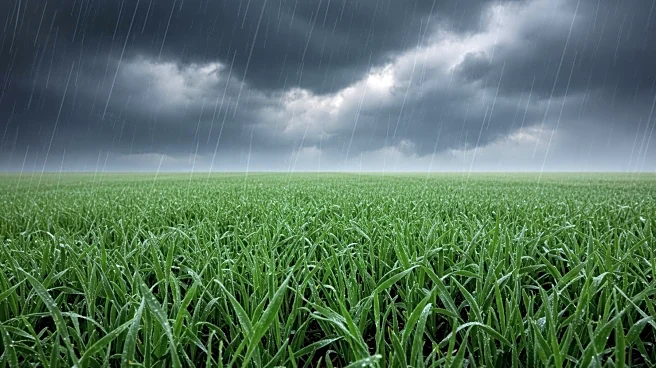What is the story about?
What's Happening?
Lithuania has declared a national emergency in response to significant damage to its agricultural sector caused by heavy rainfall this summer. According to the government, approximately 50-70% of the country's agricultural harvest has been harmed or destroyed. The persistent rain has led to flooded fields, preventing farmers from harvesting their crops and reducing the quality of the remaining produce. Lithuania, known for producing wheat, grains, and root crops like potatoes, has experienced its second heaviest rainfall on record during June and July, surpassed only by the rainfall in 2007. Neighboring Latvia has also declared a national emergency due to similar conditions affecting its agricultural output.
Why It's Important?
The declaration of an agricultural emergency in Lithuania highlights the severe impact of climate conditions on food production and economic stability in the region. The damage to crops could lead to shortages and increased prices for agricultural products, affecting both local and international markets. Farmers in Lithuania face significant financial losses, which could have broader economic repercussions. The situation underscores the vulnerability of agricultural sectors to extreme weather events, prompting discussions on the need for improved infrastructure and support systems to mitigate such impacts. The emergency measures may also influence policy decisions regarding climate adaptation and agricultural resilience.
What's Next?
Lithuania's government is expected to implement measures to support affected farmers and stabilize the agricultural sector. This may include financial aid, infrastructure improvements, and strategies to prevent future damage from similar weather events. The situation could prompt regional cooperation among Baltic countries to address shared challenges in agriculture and climate resilience. Stakeholders, including policymakers and agricultural organizations, may advocate for increased investment in climate adaptation technologies and practices to safeguard food production against extreme weather conditions.
Beyond the Headlines
The agricultural emergency in Lithuania raises broader questions about the impact of climate change on global food security. As extreme weather events become more frequent, countries may need to reassess their agricultural practices and invest in sustainable solutions. The situation also highlights the importance of international collaboration in addressing climate-related challenges, as neighboring countries face similar issues. Long-term strategies may involve diversifying crops, improving water management, and enhancing soil health to build resilience against future climate disruptions.















